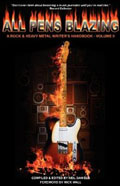
With Volume II of 'All Pens Blazing' arriving within twelve
months of the first, there is an impression that this series could run and run.
For the most part, rock writers are as vain as their subjects, and shameless
self-publicists, so in that context there will be no shortage of material in the
future. Indeed, like Spitting Image in the eighties for politicians, if
you are a rock writer of any substance you should be in here.
Erstwhile GRTR! scribe Neil Daniels has put together another selection of rock
hack reminiscences and widened his net to include some glaring omissions in the
first book. So we get - for example - Mick Wall, Harry Doherty and our own Jason
Ritchie (representing I have to say the very best of online journalism that is
GRTR!).
The best rock journalism has humour, insight, but most of all humility, and
sadly some rock hacks give the impression they are more important than some of
their subject matter. Mick Wall reflects this aspect in his introduction.
Neil has widened his scope a little from his essentially hard rock fixated
volume 1, now including publishers (Chris Ingham) and writers who have mainly
produced books rather than magazine articles (for example GRTR!'s Billy James).
He's also allowed admirable plugs for Classic Rock Society and Fireworks, via
Martin Hudson and Phil Ashcroft respectively.
There is still an undercurrent that online cannot match offline journalism in
terms of quality and it seems that some journalists (and publishers) still need
a wake up call. Many readers have noted - for example - a certain laziness
amongst the Classic Rock journalists and an impression they are
invincible when it comes to rock writing. In the internet age, they are not.
Admittedly the internet age is where every man and his dog can publish
their thoughts instantly and where aspiring writers can cut their teeth
on the Amazon website. Some filtering is necessary - both by the
reader and the publisher - the latter is invariably delivered by strong
editorship and a pay cheque.
Daniels' question and answer approach is a well-worn technique and works well in
the context of a 'vox pop' - talking of which, the format apes the book of that
name by the distinguished music journalist Michael Wale in 1972. Where is he in
this collection?
There is some discrepancy in the length of responses, so for example Phil
Ashcroft fills nearly eight pages, Arnaud Durieux (who??) runs out at a paltry
two.
Some significant omissions still, though, and in the online context there is no
interview with Andrew McNiece who has done much to fly the melodic rock flag.
In terms of the more significant mags, 'Q' and 'Mojo' are still
under-represented. Where is Fred Dellar? And going further back there are many
more scribes that could be included (eg Colin Irwin who wrote the folk pages in
Melody Maker). And in folkier vein, 'Rock & Reel' is conspicuous by its absence amongst
contemporary journals.
Daniels has improved the typeface but the book still lacks an index which may
become more critical as the series progresses, as over time it will no doubt
become more of a historical document as rock journalism moves online.
This is an admirable self-publication job but size is
everything: the first volume (smaller) won't now sit well with the
second (larger) on the shelf. Hopefully Neil will correct that and the
original typeface issue on the next reprint.
But once again, this rollercoaster ride through some of rock's back
pages will bring a glow to the cheek, and perhaps even moistness to the
mouth, of any self-respecting rock fan who has ever bought a music paper
or mag since the 1970's.
****
Review by David Randall
Volume I review
For more about rock journalism, check out Rock's Backpages
 |
Print this page in printer-friendly format |
 |
Tell a friend about this page |

